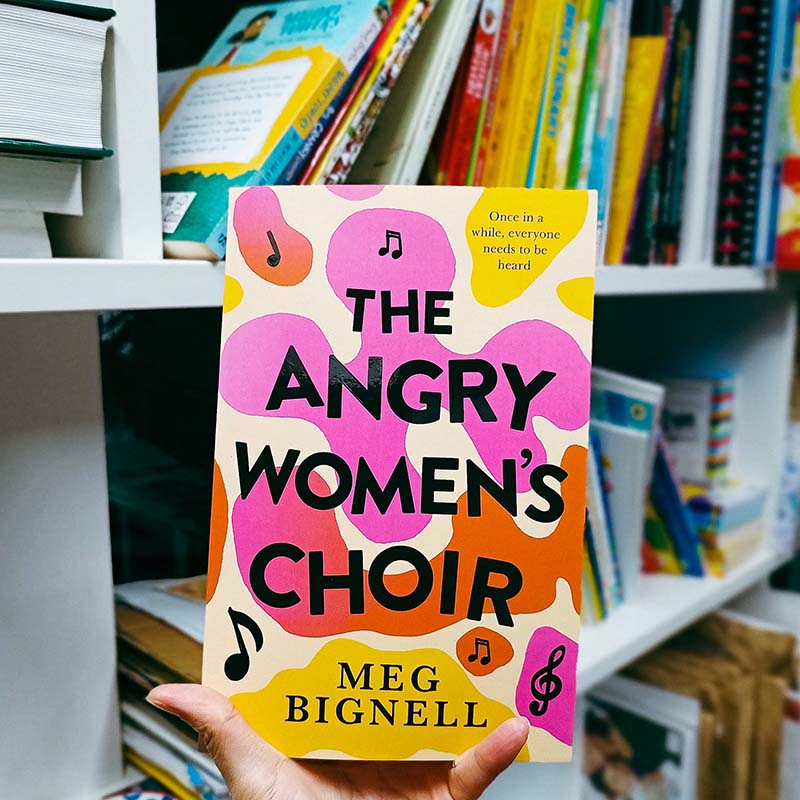Meg Bignell’s The Angry Women’s Choir shines the spotlight on how caregiving and emotional labour have become “horrible undervalued and compromised”.
I picked up The Angry Women’s Choir at a rather challenging—and upon hindsight, timely—point in life.
I was mentally exhausted from taking on too much and being everything to everyone. I felt underappreciated and undervalued. I was close to burnout but didn’t recognise that I had to stop.
Turns out, I wasn’t alone.
Making friends with the choir

Reading The Angry Women’s Choir smoothed my ruffled feathers, gave me something to smile about and offered me the hug I needed—not before it got me riled up with righteous anger. Thankfully, it’s not a novel without a happy ending, and by the end, hopefully without giving too much away, I was holding my left hand up in the air with my index finger pointing upwards.
I, too, wanted to #jointhechorus. And I grew to love the members of the choir like they were my friends. Oh, how I wished they were my friends, with their colourful history, feisty attitude, and a huge dose of love and kindness.
From fiery activist Bizzy Nancarrow, “murderess” Eleanor and suburban housewife Freycinet Barnes and more, each character had a story worth knowing and an underlying anger worth understanding. (Editor’s note: There is a fair amount of swearing in the book. Did I mention these women were colourful and feisty?)
“On the first page of my original notebook for this book, I made a list of potential characters whose life stories or situations were of interest to me or seemed as though they deserved illumination,” says Meg about the inspiration behind the characters of the novel.
“Some of them were things I wanted to learn more about, such as the experience of unwed mothers in mid-century Ireland. Then as I read and researched, the characters came to life and I felt committed to them. There was no going back! They created this story as much as I did.”
The third wave of feminism
Set in modern-day Hobart just before the start of the COVID-19 pandemic, The Angry Women’s Choir is one of those deceptively easy-to-read novels harbouring a very pertinent and important message.
The Angry Women’s Choir is, at its core, about giving a voice to women. On the surface, it may seem like one with the familiar formula of “lonely, underappreciated housewife finds her voice”, but it also creates a space for the forgotten and unseen women.
This is a story that also includes the refugee, the single mother, the ex-convict, the struggling teen, to name a few. This is a story about how patriarchal society still is despite the waves of feminism, and that misogynistic behaviour still exists, only perhaps a little more disguised. Take this excerpt for example:
“Wokefishing?” Frey asks.
“Men who pretend to be feminists so they can satisfy their egos and their penises. They usually make a big song and dance of their liberal views but have the full kit of microaggressions on hand at all times. Bellavance is a particularly performative wokefish. He’ll be the keynote speaker, mansplaining feminism at the Mother’s Day breakfast.”
As Meg says, “Feminism can take so many forms, and the predominate force has definitely changed over the years. I grew up in the ‘women can have it all and smash glass ceilings’ era, which focussed on women in the workplace, but it concerns me that those ideals left caregiving and emotional labour horribly undervalued and compromised.
“We have definitely made progress but events such as the Roe vs Wade overturn and the election of Trump are evidence that the rust is still there and can weaken our structures. I consider myself a socialist intersectional feminist. I think our care should be remunerated, and indoctrinated conventions re-examined. Nothing too tricky!”
Wit and heart
Despite a rather serious message, the charm of The Angry Women’s Choir lies in the fact it is still filled with humour and heart. So much heart.
The novel will make you angry, but it will also make you laugh. It will make you indignant, but it will also break your heart. There is oppression, but there is also love. And as Meg says, she’d really wish her readers will walk away with these four things: “Be kind. Listen. Bear witness. And think outside convention.”
For all its charm and wit—of which there is plenty—The Angry Women’s Choir also left me feeling embarrassed and disappointed when it came to its mention of Christianity.
As a Christian, I feel its portrayal of Christianity was rather one-sided. The Christianity displayed in the novel was one that was unforgiving, irrelevant and most definitely lacking in any form of love or kindness. It’s a Christianity that has no space for women, especially those who find themselves on the fringes.
However, as what most Christians would consider to be a rather liberal one, I can see why. The Christianity seen by most of the public today is a Christianity that riles against what many believe are basic human rights. Conservative, right-wing Christianity is loud and (very) visible, and inflexible, exclusive and unaccepting. No wonder it’s rejected by many.
If anything, The Angry Women’s Choir is a wake-up call for Christians to act better, to love more and to show kindness. To everyone.
A call to alms
For all the women taken for granted by their children and partners.
For all the women gaslighted, emotionally abused or physically hurt.
For all the women suffering from years, decades, centuries of patriarchal oppression.
For all those women and more, The Angry Women’s Choir is a call to arms (or “alms” as the book points out—”That’s A-L-M-S as in care not A-R-M-S as in weapons”). It’s not so much about fighting back, but more about speaking up, finding a voice and most of all, love. Loving ourselves and our sisters. And for the non-wokefishies to stand besides us, supporting us and helping us make a change for the better.
That’s because for all the issues raised in the book, the solution, as Meg puts it, lies in community: “Community and friendship and creative gatherings can generate incredible power. We’re tribal beings, we’re not meant to function alone.”
For that, I’d like to think Mums At The Table is an angry women’s choir of sorts because at its core, we’re about supporting mums in the motherhood journey. We may be Christian, but we’re not here to judge. We’re here to be with you, to be the village it takes to raise a child—and a mum.
And in my life’s most challenging point, when I felt myself falling to pieces, it was a sisterhood that lifted me up. Sat with me, cried with me, listened to me and lovingly put me back together again. Most magically, not all of them did it in person. A virtual community filled with heart helped as much.
A sisterhood. And a book titled The Angry Women’s Choir.
If you have experienced sexual assault, domestic or family violence, contact 1800RESPECT (Australia) | It’s Not OK (New Zealand)
How helpful was this article?
Click on a star to rate it!
0 / 5. 0
Be the first to rate this post!
Melody Tan
Related posts
Subscribe
Receive personalised articles from experts and wellness inspiration weekly!


